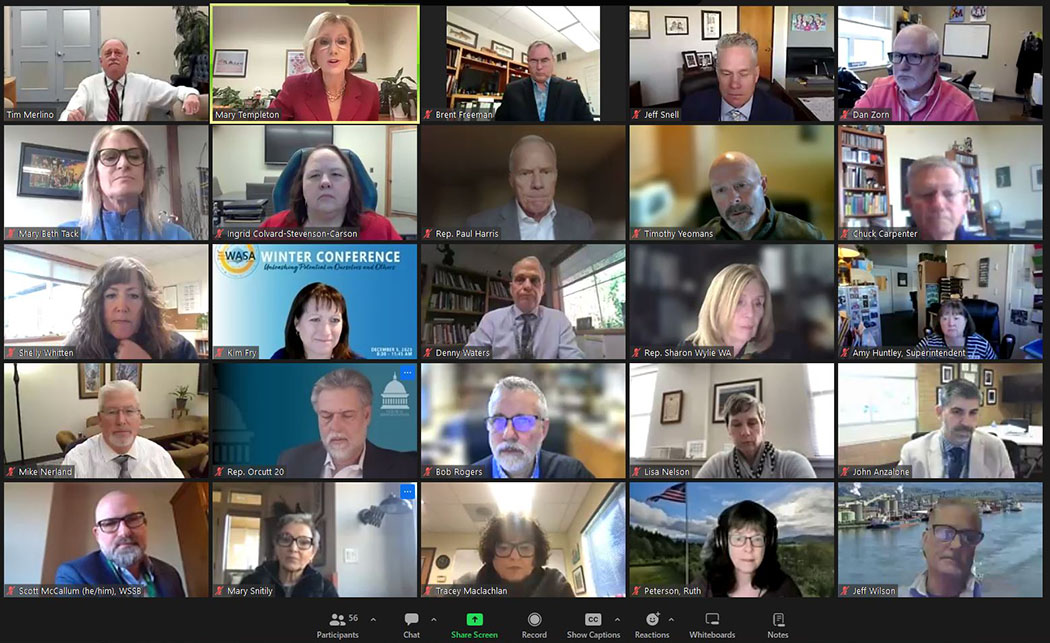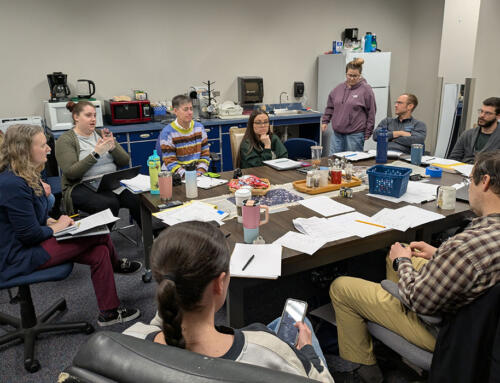Sharing stories of hope and discussing unmet funding needs were the focus of the November 27, 2023, ESD 112 Legislative Forum. The forum, convened virtually for the fourth year in a row, garnered the attendance of 11 legislators and one legislative staffer from the 14th, 17th, 18th, 19th, 20th, and 49th Districts. Dozens of school superintendents and other education leaders also attended the forum, with a total of 80+ participants for the two-hour meeting.
In addition to sharing stories about students’ learning recovery, regional school leaders shared insights and information on priority funding requests for the legislature to consider ahead of the 2024 Legislative Session. Topics included the formula used to provide state funding to school districts (the Prototypical Funding Model), funding for increasing school Materials, Supplies, and Operating Costs (MSOCs), funding for Special Education, and addressing the need to update school facilities.
The Prototypical Schools Funding Model
School superintendents Dr. Jeff Snell (Vancouver Public Schools), Peter Rosenkranz (La Center School District), and Michael Green (Woodland School District) shared with legislators the ongoing need for local levies to subsidize the Prototypical School Funding Model. They advocated for an increase in the number of state-funded classified positions (food service workers, paraprofessionals, bus drivers, office personnel, and custodians) as well as substitute teacher positions.
“Only ten percent of the paraprofessionals at VPS are funded by the prototypical model,” said Vancouver Public Schools Superintendent Dr. Jeff Snell.
“If we are unfunded by the state in some areas, this impacts our district’s ability to serve students in many other areas,” Superintendent Michael Green said.
Materials, Supplies, and Operating Costs (MSOC)
School leaders shared with legislators how the rising cost of necessities like technology, utilities, insurance coverage, curriculum, professional development, and facilities and maintenance have impacted their ability to balance their budgets. Superintendent Tim Merlino (ESD 112), Dr. Ingrid Colvard (Stevenson Carson School District), Dr. Dan Zorn (Longview Public Schools), and Brent Freeman (Wahkiakum School District) shared that there is an ever-growing gap between state funding provided for MSOC and the actual cost of these important operational needs that must be paid.
“In school districts across the state, there is a $284 million funding gap – and the gap is growing with inflation – between the state funds provided to school districts for MSOCs and what it actually costs school districts to have insurance, pay their utilities, and maintain their facilities,” said ESD 112 Superintendent Tim Merlino.
“The result is that there are fewer teachers and staff and program reduction in other areas is necessary. That means fewer paraeducators, higher class sizes, fewer course offerings, and fewer district support personnel,” said Dr. Ingrid Colvard.
Special Education Funding
School leaders acknowledged the prior year’s Special Education funding increase as an important and appreciated “down payment” toward fully funding the actual costs associated with educating special education students. Superintendent John Boyd (Evergreen Public Schools) and Executive Director Jeff Niess (ESD 112 Specialized Student Services) offered their insights on the benefits of having special education students included in general education classrooms via inclusionary practices. Ocean Beach Superintendent Amy Huntley shared that inclusion is working in her school district, with special ed students scoring 10 to 15 percent higher on their standardized test scores since the district began implementing inclusionary practices. Legislators were invited to visit classrooms to see inclusion at work. While touting special education successes, school leaders acknowledged that inclusion of special education students in general education classrooms “just costs more,” and additional funding is needed to guarantee equal rights in education for students with disabilities.
School Facilities Updates
Legislators heard from school leaders that the issue of school facilities updates and the approval of bonds to fund school facilities needs continues to create challenges. School leaders from Castle Rock School District (Superintendent Ryan Greene), Battle Ground (Superintendent Denny Waters), and Klickitat (Superintendent Kendrick Lester) offered small, medium, and large-school perspectives on the difficulty of passing bonds and updating facilities due to Washington State’s 60 percent supermajority requirement for bonds.
“Castle Rock has had three failed bonds in the last seven years. Each time, the measures would have passed if only a simple majority were required,” said Superintendent Ryan Greene. “Our oldest facility was built in 1914 and updated in 1985. We have generations of kids that have not seen facilities updates in Castle Rock.”
“These issues are not wants, these are needs,” said Superintendent Denny Waters. “We know there is not an easy answer to this, but the issue of school facilities must be addressed.”
School leaders acknowledged that while a simple majority voting requirement for school bonds was unlikely, there is significant support for such a change in the education community. Superintendents asked for the expansion of OSPI’s capital facility grant programs to include more funding and more schools as a possible solution to the school facility update dilemma.
View ESD 112’s 2024 Legislative Priorities > (opens in a new window)




